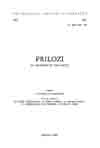Jezičke i sadržinske osobenosti vakuf- nama iz Mostara (druga polovina XVI stoljeća)
The peculiarities of language and contents of the waqufnama of Mostar (second half of the XVIth century)
Author(s): Muhamed A. MujićSubject(s): Museology & Heritage Studies
Published by: Orijentalni Institut u Sarajevu
Summary/Abstract: Among the rare, well-preserved original manuscripts of waqufnamas from the earlier period of the Ottoman rule in the Yugoslav lands, a collection of the waqufnamas from Mostar which are kept in Ghazi Husref-bey's library in Sarajevo, has a very special place. The present author pointed out certain peculiarities in the contents of the waqufnamas written in the second half of the XVIth century, in comparison with other waqufnamas from other parts of the Yugoslav lands from the same period. The author, primarily, emphasised the fact that those waqufnamas were written in a fine, correct Arabic, in a natural, in a concise manner, without any unnecessary additions, at the time when the Arabic language had long since been going through the stage of decadence on its original territory. It has especially been pointed out, that both, introductory parts of the waqufnama, which by its nature had been written in carefully picked words and in a pompous style, and all other parts, in which it was difficult to achieve the same style since the subject-matter which consisted of the object of the waquf required the vocabulary for common, everyiday use and the simple style of writing, were written in the same style. There is no monotony or dryness of the style, but they keep the attention of the reader b their simple but forceful sentences, as if a literary work and not a waqufnama were in question! All the above has been illustrated by the author's reviews of some parts of those waqufnamas in his own translation into Serbo-Croatian. Pointing out those parts of the waqufnamas in which the reminiscences of the waqif on the life in this world, its transistoriness and worthlesness, about man's place in it, and the eternity of the other world, all of which were an introduction for the very act of the creation of the waquf, which was to make the memory of the waqif eternal the present author believes that such meditations, interwoven with the quotations from the Koran and the sayings of Muhammed, as well as the sayings taken from the wealth of Oriental-Islamic treasury, give the mentioned waqufnamas the chavacter of the specific literary texts. At this point, the author, in order to corroborate his statements, has given the certain parts of the texts of the waqufnamas in his own translation into SerboCroatian. The collection of these waquf-namas, with their specific institutions, greatly enlarged our knowledge on the role and place of the waquf in the communities in which they had been fouded. The characteristic attitudes and the institutions that give special features to these waqufnamas, had, mostly, caritative, educational and social, legal and cultural character.
Journal: Prilozi za orijentalnu filologiju
- Issue Year: 1976
- Issue No: 25
- Page Range: 203-225
- Page Count: 23
- Language: Bosnian

